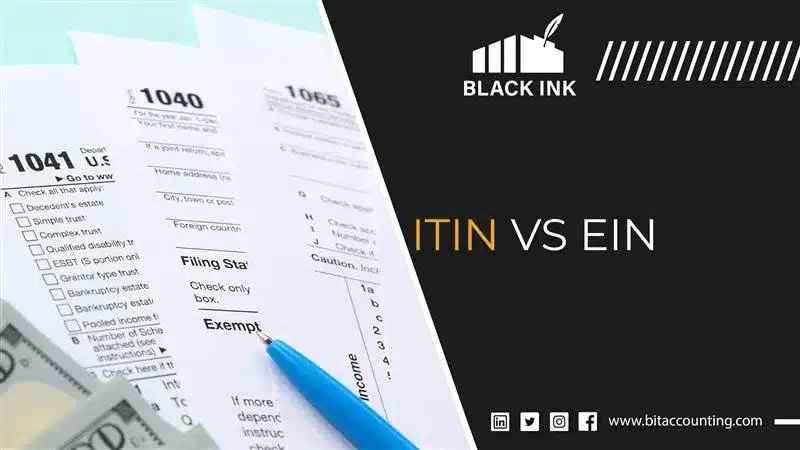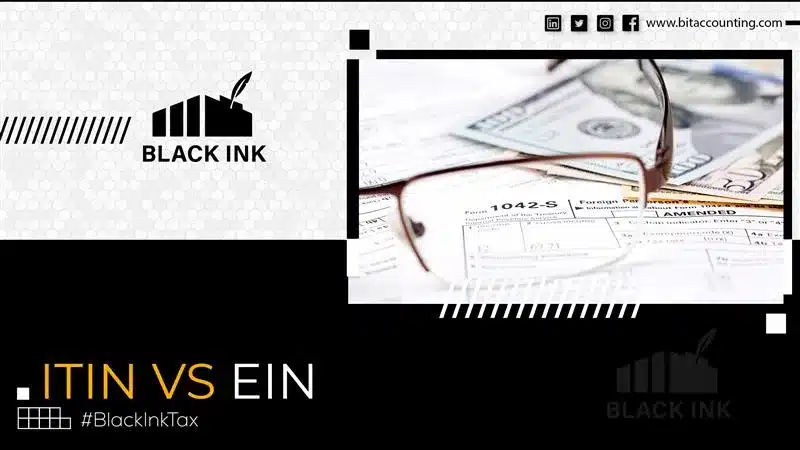
Table of Contents
ITIN vs EIN: Which One Do You Need for Taxes?
When it comes to paying taxes in the U.S., things can get confusing—especially if you’re not a citizen, own a business, or are new to the system. One common question many people have is: What’s the difference between an ITIN and an EIN?
In this guide, we’ll walk you through everything you need to know about these two types of tax ID numbers. We’ll explain what each one is for, who needs them, and how to apply. Whether you’re a small business owner, a freelancer, an immigrant, or someone investing in the U.S.—this article is for you.
Let’s break it down, nice and easy.
What Is an ITIN (Individual Taxpayer Identification Number)?
An ITIN, or Individual Taxpayer Identification Number, is a special number the IRS gives to people who need to pay taxes but aren’t eligible to get a Social Security Number (SSN).
This number is only for tax purposes. That means:
- You can use it to file your taxes,
- But you can’t use it to work in the U.S. or get Social Security benefits.
The IRS gives out ITINs to help people stay on top of their tax responsibilities—even if they’re not U.S. citizens.
Who Needs an ITIN?
You might need an ITIN if:
- You’re a non-resident alien (someone who lives in another country but earns money in the U.S.)
- You’re a dependent or spouse of a U.S. citizen or green card holder and don’t qualify for an SSN.
- You’re a foreign investor who makes income from U.S. sources.
- You’re a student, researcher, or scholar in the U.S. under a visa and need to report income.
So, if you’re earning money in the U.S. and don’t have an SSN, an ITIN helps you follow the tax rules.
How to Apply for an ITIN
Here’s how you can get an ITIN:
- Fill out Form W-7: This is the official IRS form to request an ITIN.
- Collect your ID Documents: You’ll need proof of identity and foreign status, like a passport.
- Submit your Application: You can send it, By mail, Through an IRS-certified acceptance agent, and At certain IRS offices overseas
- Processing Time: Usually, it takes about 7 weeks, but it can be longer during tax season.
- Keep in Mind: If you don’t use your ITIN for 5 years, it expires. So, it’s important to file taxes regularly.
Pros of an ITIN
Having an ITIN can help you:
- File your taxes properly
- Stay in compliance with U.S. tax laws
- Claim tax credits you qualify for, like the Child Tax Credit (in some cases)
Cons of an ITIN
However, an ITIN has limits:
- It doesn’t let you work legally in the U.S.
- It doesn’t give you Social Security or retirement benefits
What Is an EIN (Employer Identification Number)?
An EIN, or Employer Identification Number, is like a Social Security Number for businesses. It’s given by the IRS to help identify your business for tax purposes.
You’ll use an EIN to:
- Pay business taxes
- Hire employees
- Open a business bank account
- Apply for business credit
Basically, if you’re running any kind of business in the U.S., you likely need an EIN.
Who Needs an EIN?
You may need an EIN if you are:
- A business entity (LLC, corporation, or partnership)
- A sole proprietor who has employees
- A trust or estate
- A nonprofit or religious organization
Even if you’re a freelancer or contractor, getting an EIN can help separate your business finances from your personal ones.
How to Apply for an EIN
You’ve got a few easy options:
- Online: The fastest way—go to the official IRS website.
- Mail or Fax: Fill out Form SS-4 and send it in.
If you apply online during IRS hours, you can get your EIN immediately.

Pros of an EIN
Why should you get one?
- Keeps your business and personal taxes separate
- Required if you hire employees
- Helps you build credit for your business
- Makes opening business bank accounts easier
Cons of an EIN
A few things to note:
- It’s not for personal tax filing
- You only need it if you’re running a business or organization
Key Differences Between ITIN vs EIN
Here’s a simple side-by-side comparison:
Feature | ITIN | EIN |
Purpose | For personal tax filing | For business tax filing |
Who gets it? | Individuals without an SSN | Business owners or entities |
Work Authorization? | No | No |
Social Security Benefits | No | No |
Used for Hiring? | No | Yes |
Opens Bank Accounts? | No (personal use only) | Yes (for businesses) |
Required Documents | Form W-7 | Form SS-4 |
Can Foreigners Apply? | Yes | Yes |
When Do You Need Both ITIN and EIN?
In some situations, you might need both:
- You’re a foreign entrepreneur running a U.S. business
→ Use an EIN for your business and an ITIN to file your own taxes. - You’re an investor from another country with ownership in a U.S. company
→ You’ll need an EIN for the company and an ITIN for personal filings. - You’re in a spousal business partnership, and one spouse doesn’t have an SSN
→ You’ll need an EIN for the business and an ITIN for that spouse.
Common Misconceptions About ITIN and EIN
Let’s clear up some of the biggest myths:
- Myth: “An EIN replaces a Social Security Number.”
- False. An EIN is for businesses. Individuals still need an SSN or ITIN.
- Myth: “If I have an ITIN, I can get Social Security benefits.”
- Nope. Only SSN holders qualify for that.
- Myth: “Only U.S. citizens can apply for an EIN.”
- Wrong again. Foreign business owners can get an EIN to run their U.S.-based business legally.
How to Choose Between ITIN vs EIN
Here’s a quick checklist to guide you:
- Are you filing personal taxes without an SSN? – Get an ITIN
- Are you starting or running a business in the U.S.? – Get an EIN
- Are you a foreign investor with U.S. income or a foreign business owner? – You might need both ITIN and EIN
Conclusion
Taxes can feel like a maze, but once you understand the tools you need—like an ITIN or EIN—it all starts to make more sense.
If you’re just looking to file personal taxes and don’t have an SSN, go with an ITIN. If you’re building a business, then an EIN is what you need.
Sometimes, you’ll need both, especially if you’re doing business from abroad or with partners.
Still unsure? That’s where BIT Accounting comes in. We help individuals and businesses make smart choices about taxes. Whether you need an ITIN, an EIN, or both—we’ve got your back.
FAQs
1: Can I use an ITIN to open a bank account?
Some banks may accept it for personal accounts, but not for business use.
2: How long does it take to get an ITIN?
It usually takes around 7 weeks, but can take longer during busy seasons.
3: Can a non-U.S. citizen apply for an EIN online?
Yes, but some might need to apply by mail or fax, depending on their location.
4: Do I need both an ITIN and EIN to run a business as a foreigner?
Most likely, yes—you’ll need an EIN for the business and an ITIN to file your personal taxes.
5: Can I work in the U.S. with an ITIN?
No, an ITIN does not give you work authorization.
GET FREE QUOTE FOR ALL OF OUR SERVICES
Black Ink will send you a free analysis of your current state and what would be the cost of managing either a separate accounting and bookkeeping services or a complete solution across New York, USA. Do get in touch and we will be happy to consult you with our bookkeeping services in NY, New York, USA.